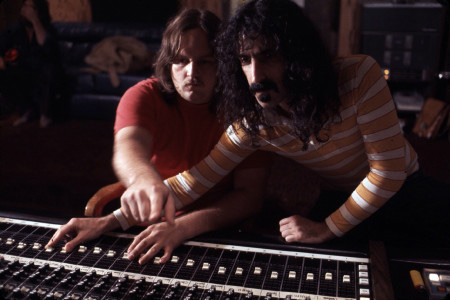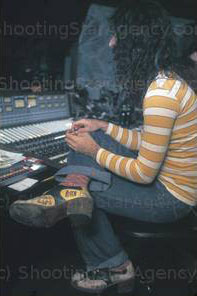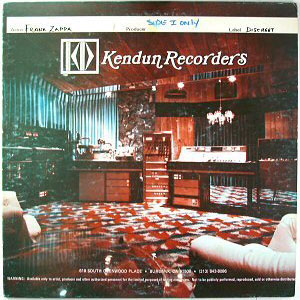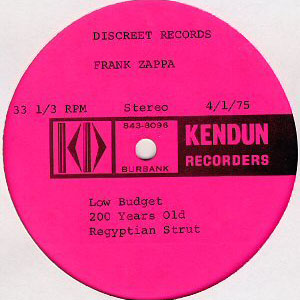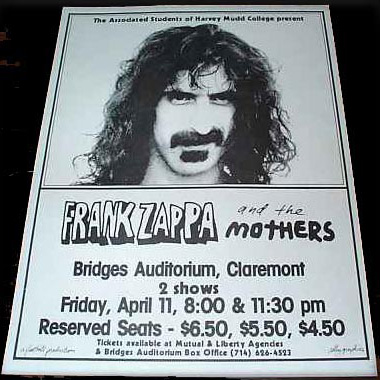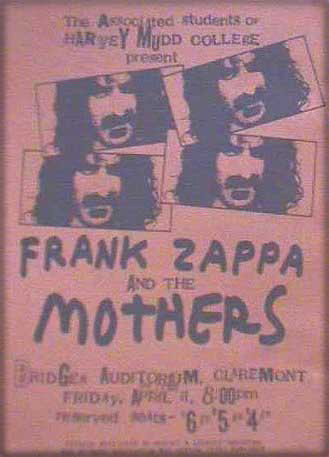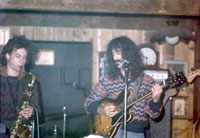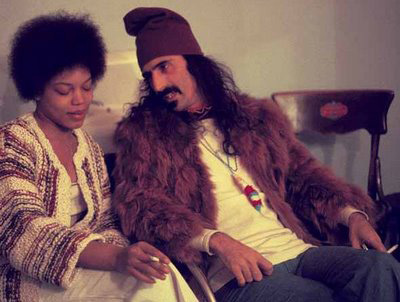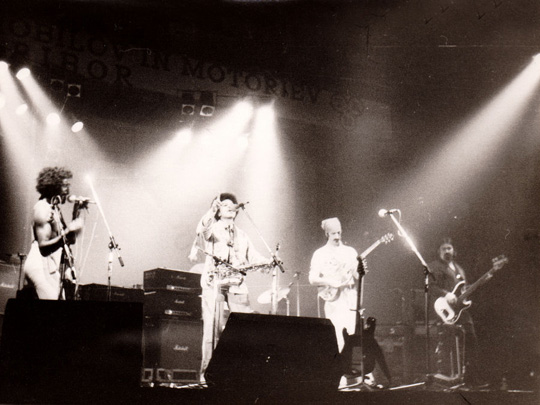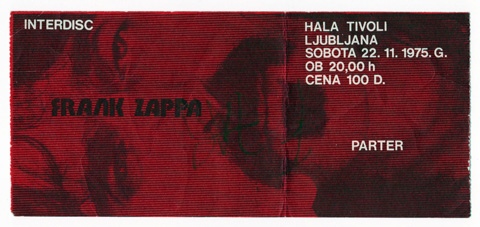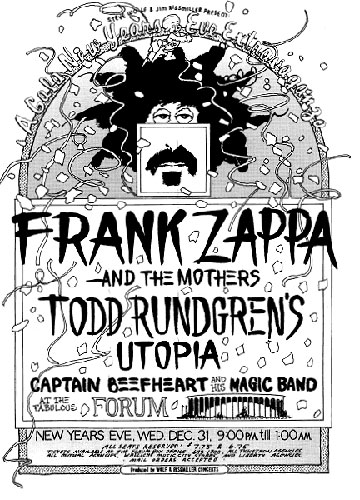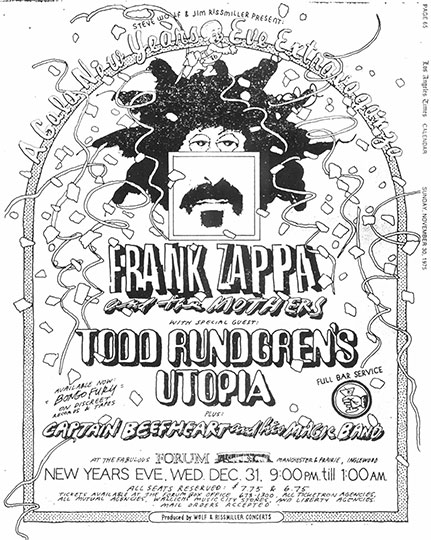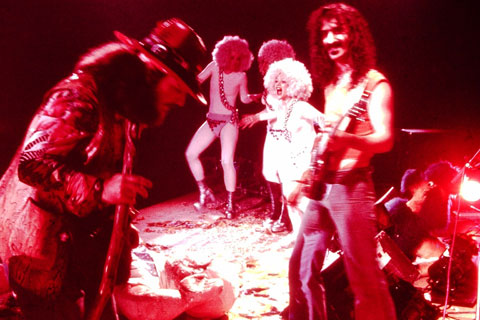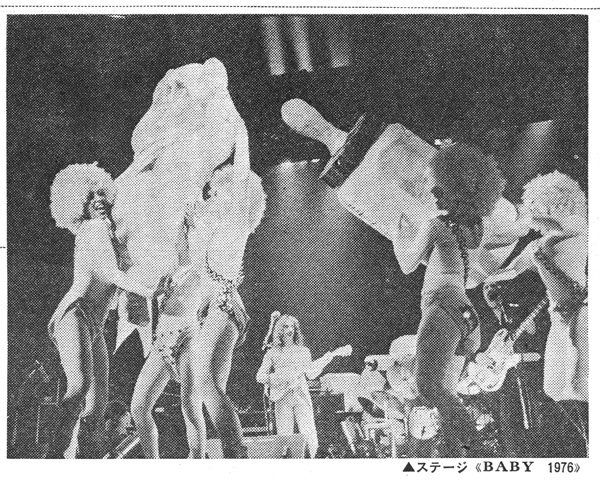The judge presiding over the court is 67-year-old Mr. Justice Mocatta. The Hon Sir Alan Abraham Mocatta, who was knighted in 1961 and received the OBE in 1944. He's been a Judge Of The High Court of Justice, (Queens Bench Division) since 1961 and was educated at Clifton College and New College, Oxford. Who's Who details a distinguished War Service Record as follows: "2nd Lieut 12 LAA Regt RA, TA, 1939; Bde Major, 56 AA Bde, 1940-41; GSO (2) AA HQ BTNI, 1941-42; Lt Col GS, Army Council Secretariat War Office, 1942-45."
Whether you can translate Who's Who's peculiar shorthand or not, it sounds pretty impressive.
The day before we got to court Mr. Justice Mocatta, who has to decide whether the AH Management were justified in their decision to cancel the concert on the grounds that Zappa's material was "in poor taste" or in any way offensive or obscene, was treated to an illustration of Zappa's music.
Mr. Alan Campbell, representing the Zappa/Cohen Bizarre Productions Inc, played the judge two songs from the soundtrack album of 200 Motels. Mr. Justice Mocatta listened, head in hands, to "She Painted Up Her Face," after which he commented: "A certain amount of the speech I could not hear." He then lent an ear to "Daddy, Daddy, Daddy." His response to the latter was: "I could not hear the beginning or the end."
Mr. Campbell, QC, suggested that the judge might like the volume of the stereo player increased to which Mr. Mocatta replied: "It's quite loud enough."
Mr. Justice Mocatta refused to listen to a third song which Mr. Campbell QC had intended to play. It was called "Penis Dimension."
"You need not listen to that particular song," said Mr. Campbell (who was educated at the Ecole Des Sciences Politiques, Paris, and Trinity Hall, Cambridge and whose clubs are listed in Who's Who as the Carlton and Pratt's).
"In fact," he continued, "we draw attention to it and it is open to reasonable objection on the ground of good taste. We have made it plain from the start we were prepared to substitute with other songs."
This [...] was a point which would be taken up by Mr. Michael Ogden, QC, who was representing the Albert Hall management. But before we move on to that matter, we'll just take in a brief exchange between FZ and Mr. Justice Mocatta. The latter was a little confused by a reference to a "groupie."
"Is a groupie a girl who is a member of the group?" he asked.
"No," replied Zappa. "She is a girl who likes members of a rock and roll band."
[...] On Wednesday the court is already in session at 10 am. Zappa is answering questions directed at him by Mr. Ogden. Mr. Ogden has been a Barrister-At-Law since 1968, and was educated at Jesus College, Cambridge. He served as a captain in the RAC (Royal Glos Hussars and l6th/5th Lancers) l944–l947.
As the legal representative of the corporation which controls the Albert Hall, Mr. Ogden has to establish, using as references the lyrics to the soundtrack of 200 Motels and the movie script, that the performance of all or parts of Zappa's material would've been (here we go again) offensive etc.
As we pick up the story Mr. Ogden is questioning the validity of Zappa's claim that the concert need not have been cancelled. If, Zappa argued, the AH authorities had specified which particular songs they considered offensive he could have amended the lyrics to ensure they were "socially acceptable."
Mr. Ogden remains somewhat sceptical about Zappa's ability to rewrite, at such a crucial point, an entre body of lyrics.
The amended version could even have been prepared by someone other than Zappa, he pressed.
"Would it speed things up if I agreed with you?" retorts Zappa, with sardonic nonchalance.
"And what if someone types it wrong?" he adds.
Mr. Ogden then diverts our attention to the actual contents of Zappa's compositions in an attempt to reveal the true nature of his lyrical flights of fantasy. He makes a reference to one song, and questions the significance of the words "dumping excreta."
Excreta, says Frank is a euphemism for the word which actually appears in the script.
This, he continues, "is a short word which represents the concept" of excreta. In rock and roll parlance, it refers to "the material" musicians carry around with them and is used in their profession.
[...] Mr. Ogden draws our attention to another FZ song, "Lonesome Cowboy Burt." The role of Burt in the movie was played by Jimmy Carl Black, the well-known redskin cowboy. This lyric, asserts Mr. Ogden, clearly indicates the desire of Cowboy Burt to have sexual intercourse with a waitress.
Mr. Ogden draws particular attention to a stanza which ends with the line "and you can sit on my face." This, he concludes, is surely a reference to the girl sitting on Cowboy Burt's face.
"Not necessarily," answers Zap. "It could mean a piggyback ride in an unusual position." That, says Mr. Justice Mocatta must be "Very unpleasant."
"He's an unusual character," comments Zappa. Both Mr. Ogden and the judge press for a further explanation of Frank's song. The song, explains Zappa, is an attempt to draw a portrait of a character called Lonesome Cowboy Burt, and, to create an authentic impression of the character and his lifestyle, he's portrayed Burt in his "normal speaking style," being obnoxious in a bar. The exchange between Burt and the waitress is based on an actual incident he witnessed.
Mr. Ogden presses on with his examination of the lines he's quoted. He considers the lines to have a "cruder" meaning than the description supplied. Doesn't it actually refer, he wonders, "to the naked buttocks of the girl coming into contact with the man's face."
Zappa smiles. The line in question, he says, was "written on the wall of a toilet where people like Cowboy Burt would go . . . "
He runs his fingers through his hair and looks suitably pleased with himself. He's looking unusually smart today. Subdued checked suit and conservative tie, careful to appear as unprovocative as possible. But sharp-tongued enough.
The next song which Mr. Ogden inspects is "Would You Go All The Way." "Going All The Way" he says, "that's another reference to sexual intercourse?"
"It's an archaic expression," replies Zappa. It was "used in the 1950s to express sexual intercourse." In fact, it transpires that it's a song about US soldiers and is only incidentally about sex.
Mr. Ogden again quotes from the lyrics. The section singled out this time describes a guy out on a date with his chick. His hand is on her shoulder, her arm, her elbow . . . Suddenly, her brassiere has VANISHED. This, according to Mr. Ogden's interpretation, suggests that the male has his hand on the female's breast! Was this not the case, and if not, what happened to the brassiere?
"The brassiere has disappeared mysteriously in the dark of the theatre," offers Zappa.
"What is this monster," asks Mr. Ogden, referring to a subsequent line which, rather ambiguously, describes the sudden emergence of a "monster." The couple are watching a movie, says Zappa, and . . .
